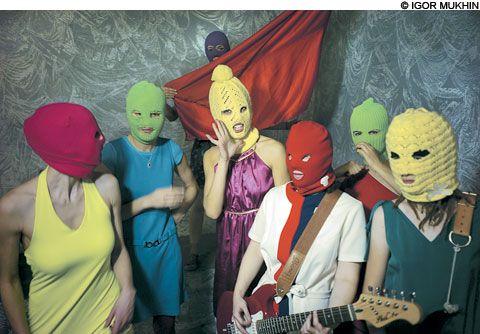
TROUBLE MAKERS Russian feminist punk troupe Pussy Riot face jail time for causing “moral damange.” |
On a February afternoon in Moscow, ten or so 20-something Russian women enter the city's main church, the Cathedral of Christ the Saviour, wearing short dresses, neon tights, and bright, matching balaclavas — knitted ski masks concealing their identities. Another enters with an electric guitar. As she pounds out a few quick, abrasive chords, the others line up at the altar, hold their fists up in the air, jumping and singing with a fierce riot-grrrl energy.
The whole performance is quick; in total, it lasts not even a couple of moments. But almost immediately, the young women — members of a Russian feminist punk group called Pussy Riot — are detained by police.
A few days later, on March 3, Maria Alyokhina, 24, and Nadezhda Tolokonnikova, 23, are arrested by Russian authorities. Thirteen days later, EkaterinaSamutsevitch, 29, is also arrested. They are imprisoned and refused bail. And they might not be out for seven years.
News of the Pussy Riot arrests rapidly spread throughout international media headlines, turning a group of girls in multicoloredhead coverings into poster children for the current youth protest culture in Russia, continuously expanding and increasingly creative.
Part protest punk band, part DIY street theater, Pussy Riot first attracted attention with their radical, anti-authoritarian sentiments and dedication to illegally playing guerilla gigs in public places like the Moscow's subways, town squares, roofs, shops, streets — even a fashion show. The collective includes around 25 people — about 10 performers and 15 who record videos of their shows, and create high-energy montages which have been going viral on the Internet for the past year. They keep their identities anonymous.
Pussy Riot formed last fall, mobilizing in response to the notoriously anti-woman Vladimir Putin's announcement of his presidential campaign. Following the intense summer of 2011 — during which feminist groups in Russia spent their energies protesting government legislation restricting legal abortions — Pussy Riot rallied against the impending decade of sexist government policies, attacks on freedom of expression, and anti-activism crackdowns they feared Putin would bring. In May, Putin won the presidency — and the oppressive administration Pussy Riot foretold arrived.
During the February performance that got Pussy Riot locked up, the women occupied the Moscow cathedral to scream out a feminist punk anthem in unison, in the form of a "punk prayer." Pussy Riot called on the "Holy Mother, Blessed Virgin" to "become a feminist and throw Putin out."
As a result, the government charged the women — known popularly as Nadia, Masha, and Katya — with " hooliganism motivated by religious hatred or hostility." After the "punk prayer" incident, 10 Orthodox witnesses said they suffered "moral damage," including a security guard whose lawyer told a local paper he "has had trouble sleeping" since the event. Elsewhere in Russia, pro-Putin activists have called Pussy Riot "Satanists."